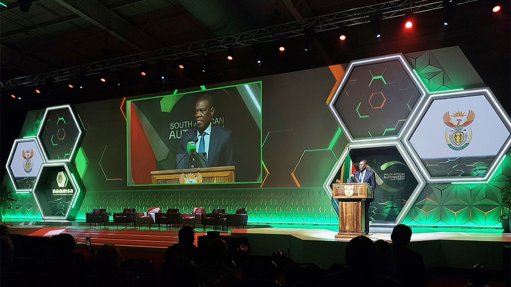
Deputy President Paul Mashatile delivers a keynote address at the SA Auto Week 2023 conference
Despite the challenges brought about by the Covid-19 pandemic and global supply chain disruptions, the South African automotive manufacturing sector still remains a significant contributor to the local economy, as highlighted during this year’s South African Auto Week, hosted by naamsa | The Automotive Business Council, in Johannesburg, from October 11 to 13.
In a keynote address on October 13, Deputy President Paul Mashatile noted the importance of collaboration between the local sector and government with regard to growth in local manufacturing, highlighting the need for policies that incentivise industry participants to produce vehicles in the domestic market.
"The performance of the South African automotive industry is contingent upon a strategic collaboration between the sector and government in order to foster growth, and create employment as they advance industry, particularly in the realm of manufacturing.”
To this end, Mashatile noted that BMW would be investing an additional R4.2-billion to manufacture a plug-in hybrid version of the next-generation X3 sport activity vehicle for 2024 at its Rosslyn manufacturing plant, in Gauteng. The Rosslyn plant will be the only manufacturing hub globally to produce the hybrid vehicles.
"This is a very important step for the country and we must continue creating favourable conditions to attract more investments and opportunities such as this in our country,” he said.
During the conference, Deputy Transport Minister Lucy Mangcu also noted that the introduction of electric vehicles (EVs), as well as the adoption of the Internet of Things into vehicle manufacturing, required a “deeper analysis and collaboration” between government and the automotive sector.
Mancgu noted that the Department of Transport was working on ensuring the roll-out of a network of EV charging stations.
In this vein, Mashatile argued that facilitating a fair and equitable energy transition required broadening the scope of local manufacturing, including value addition and components for new-energy vehicles (NEVs), while sustaining jobs and creating more employment opportunities. He said the transition to NEVs was inevitable.
Meanwhile, Mashatile also emphasised the importance of supporting upskilling initiatives to enable South Africa to develop and manufacture vehicles locally and address the issue of unemployment facing the country.
“Attaining a prosperous South Africa is indeed the responsibility of all of us. We must continue to strengthen these partnerships and advance towards a nation that is embedded in social compacts for the greater good . . . We are continuing on this journey with you, and I'm convinced that we will succeed.”